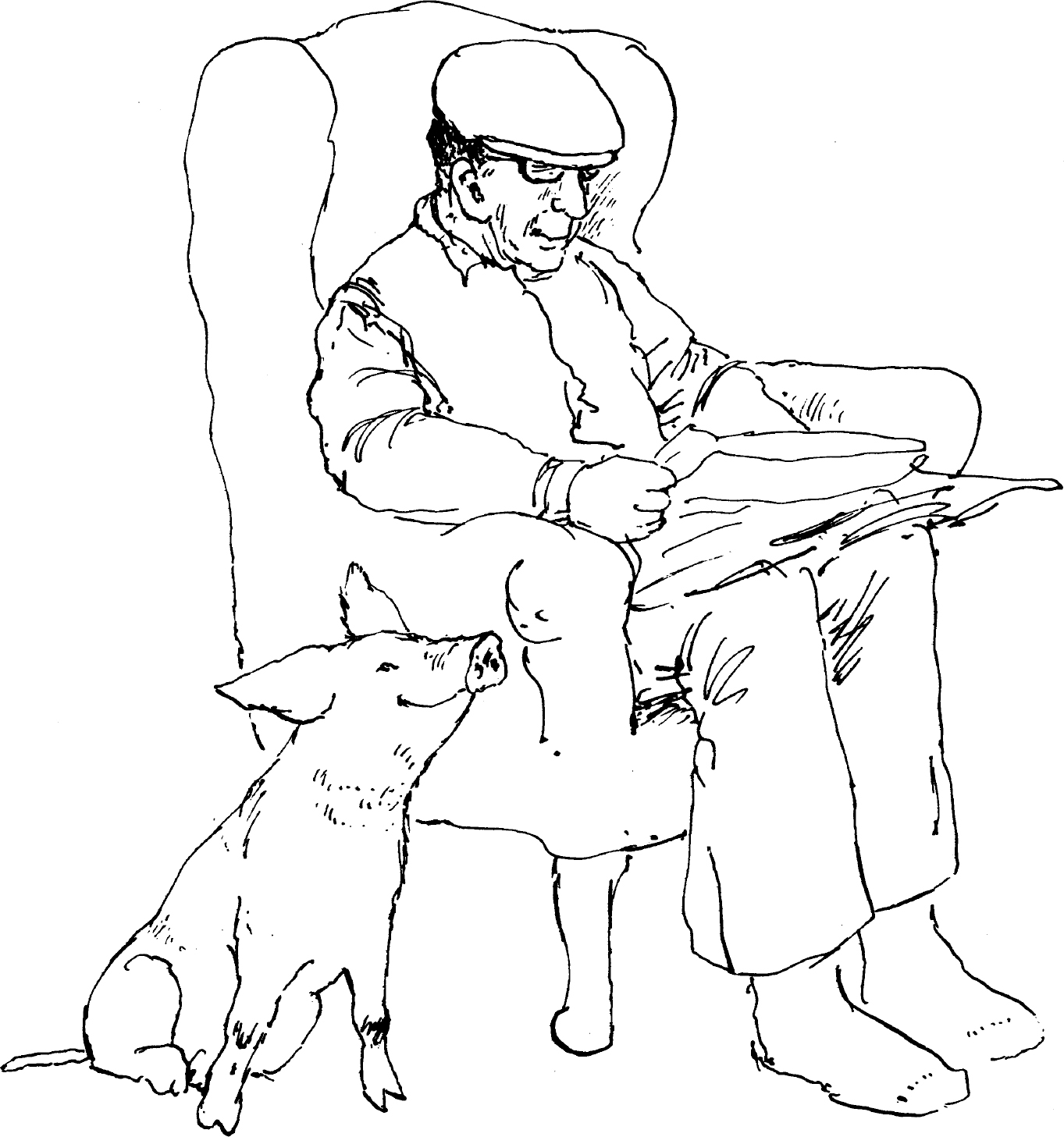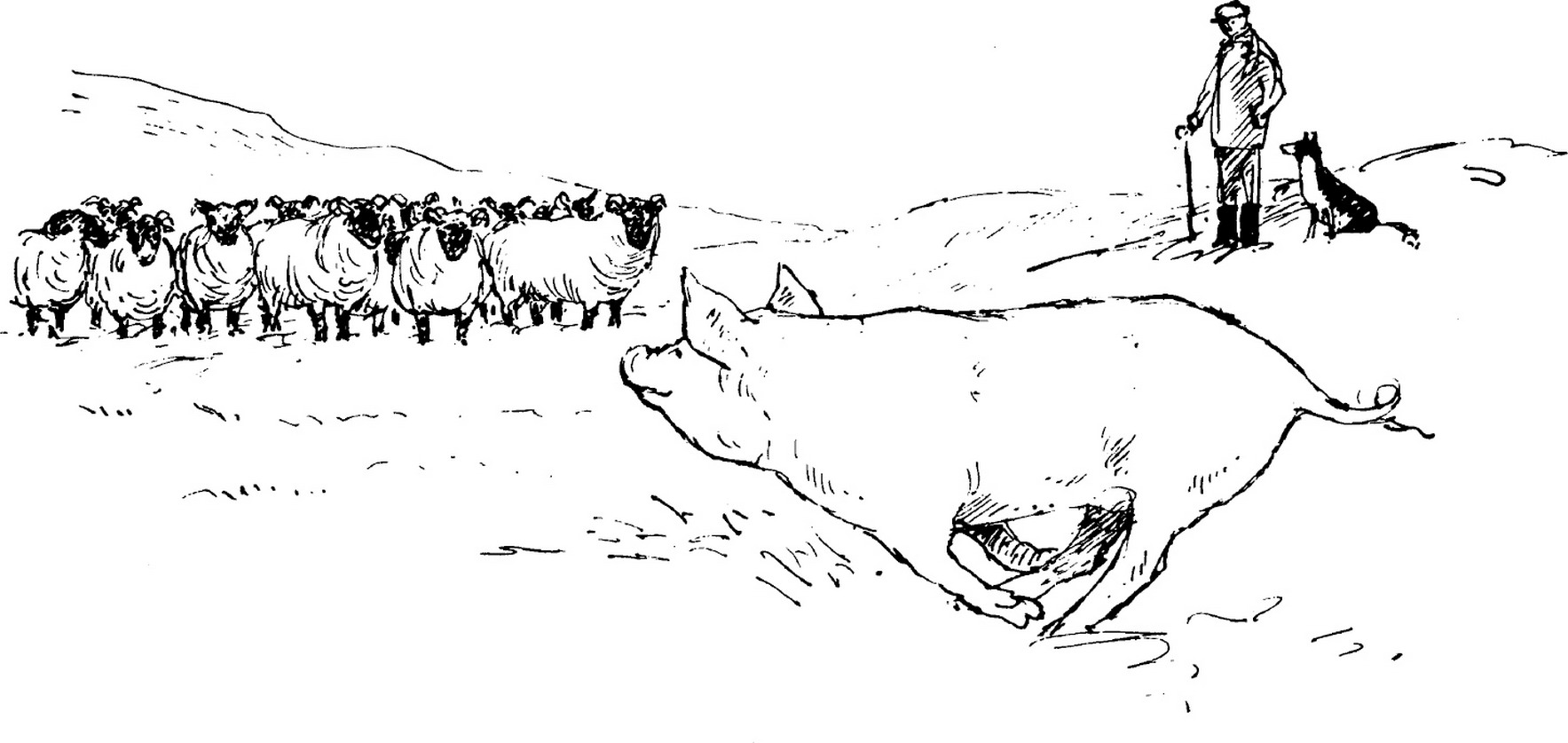CHAPTER 10
“Memorize it”
Because Babe had now saved the flock not only from rustlers but also from the worriers, the Hoggets could not do too much for him.
Because he was a pig (though Farmer Hogget increasingly found himself thinking of Pig as Dog and fed him accordingly), they gave him unlimited supplies of what they supposed he could not have too much of—namely, food.
Because he was strong-minded and reveled in his newfound speed, he ate sparingly of it.
Because there was always a lot left over, Fly became fat and the chickens chubby and the ducks dumpy, and the very rats and mice rolled happily about the stables with stomachs full to bursting.
Mrs. Hogget even took to calling Babe to the back door, to feed him some tidbit or other that she thought he might particularly like; and from here it was but a short step to inviting him into the house, which one day she did.
When the farmer came in for his tea, he found not only Fly but also Pig lying happily asleep beside the old stove. And afterward, when he sat down in his armchair in the sitting room and switched on the television, Babe came to sit beside him, and they watched the six o’clock news together.
“He likes it,” said Hogget to his wife when she came into the room. Mrs. Hogget nodded her head a great many times, and as usual had a few words to say on the subject.
“Dear little chap, though you can’t call him little no longer, he’s growed so much, why, he’s big enough to you-know-what, not that we ever shall now, over my dead body though I hopes it ain’t if you see what I do mean, just look at him, we should have brought him in the house long ago, no reason why not, is there now?”
“He might mess the carpet,” said Farmer Hogget.
“Never!” cried Mrs. Hogget, shaking her head the entire time that she was speaking. “He’s no more likely to mess than he is to fly, he’ll ask to go out when he wants to do his do’s, just like a good clean dog would, got more brains than a dog he has, why ’twouldn’t surprise me to hear he was rounding up them old sheep of yourn, ’twouldn’t honestly, though I suppose you think I’m daft?”
Farmer Hogget grinned to himself. He did not tell his wife what she had never yet noticed, that all the work of the farm was now done by the sheep-pig. And he had no intention of telling her of the final part of his plan, which was nothing less than to enter Pig in that sternest of all tests, the Grand Challenge Sheep Dog Trials, open to all comers! Never in his working life had he owned an animal good enough to compete in these trials. Now at last he had one, and he was not going to be stopped from realizing his ambition by the fact that it was a pig.
In a couple of weeks they would be competing against the best sheepdogs in the country, would be appearing, in fact, on that very television screen they were now watching.
“No, you’re not daft,” he said.
But you won’t get half a surprise when you sit here and watch it he thought. And so will a lot of other folks.
His plan was simple. He would appear at the Grand Challenge Trials with Fly, and at the last possible moment swap her for Pig. By then it would be too late for anyone to stop him. It didn’t matter what happened afterwards—they could disqualify him, fine him, send him to prison, anything—as long as he could run Pig, just one glorious run, just to show them all!


And they couldn’t say they hadn’t been warned—the name was there on the entry form. He had been worried, for he was a truthful man, that the heading might say ‘Name of Dog,’ and then whatever he put would be a lie. But he’d been lucky. “Name of Competitor” (the form said)…“F. Hogget.” “Name of Entry”…“Pig.”
The simple truth.
Shepherds usually give their dogs short names, like Gyp or Moss—it’s so much quicker and easier than shouting “Bartholomew!” or “Wilhelmina!”—and though someone might say “ ‘Pig’? That’s a funny name,” no one in their wildest dreams would guess that was the simple truth.
The two weeks before the Grand Challenge Trials were two weeks of concentrated activity. Apart from Mrs. Hogget who as usual was busy with household duties, everyone now knew what was going on. To begin with, Hogget altered the practice course, cutting out all the frills like the plank bridge over the stream, and he built a new course as close as possible to what he thought they might face on the day.


As soon as Fly saw this, she became convinced that what she had suspected was actually going to happen, and she told the sheep, with whom she was now on speaking terms.
Every night of course she and Babe talked endlessly about the coming challenge before they settled to sleep (in the stables still, though the Hoggets would have been perfectly happy for Babe to sleep in the house, so well-mannered was he).
Thoughtful as ever, Babe was anxious, not about his own abilities but about his foster mother’s feelings. He felt certain she would have given her dog teeth to compete in the National Trials, the dream of every sheepdog, yet she must sit and watch him.
“Are you sure you don’t mind, Mum?” he asked.
Fly’s reply was as practical as ever.
“Listen, Babe,” she said. “First of all it wouldn’t matter whether I minded or not. The boss is going to run you, no doubt of it. Second, I’m too old and too fat, and anyway I was only ever good enough for small local competitions. And lastly, I’ll be the happiest collie in the world if you win. And you can win.”
“D’you really think so?”
“I’m sure of it,” said Fly firmly, but all the same she was anxious too—about one thing.
She knew that the sheep-pig, speedy as he now was, would still be much slower than the dogs, especially on the outrun; but equally she was confident that he could make this up by the promptness with which the sheep obeyed his requests. Here, at home, they shot through gaps or around obstacles as quick as a flash, never putting a foot wrong; the ones to be shed dashed out of the ring like lightning; and at the final penning, they popped in the instant that the boss opened the gate. But that was here, at home. What would strange sheep do? How would they react to Babe? Would he be able to communicate with them, in time, for there would be none to waste?
She determined to ask the flock, and one evening when Babe and the boss were watching television, she trotted off up the hill. Since that first time when she had been forced to speak civilly to them, they no longer cried “Wolf!” at her, and now they gathered around attentively at her first words, words that were carefully polite.
“Good evening,” said Fly. “I wonder if you would be kind enough to help me? I’ve a little problem,” and she explained it, speaking slowly and carefully (for sheep are stupid, she said to herself, nobody will ever persuade me otherwise).
“You see what I mean?” she finished. “There they’ll be, these strange sheep, and I’m sure they’ll do what he tells them…asks them, I mean…eventually, but it’ll all take time, explaining things. The last creature they’ll be expecting to see is a pig, and they might just bolt at the sight of him, before he even gets a chance to speak to them.”
“Password,” said several voices.
“What do you mean?” Fly said.
“Password, password, Pa-a-a-a-assword!” said many voices now, speaking slowly and carefully (for wolves are stupid, they said to themselves, nobody will ever persuade us otherwise).
“What our Babe’s got to do,” said one, “is to larn what all of us larned when we was little lambs.”
“ ’Tis a saying, see,” said another, “as lambs do larn at their mothers’ hocks.”
“And then wherever we do go…”
“…to ma-a-a-a-arket…”
“…or to another fa-a-a-a-arm…”
“…we won’t never come to no ha-a-a-a-arm…”
“…so long as we do say the pa-a-a-assword!”
“And if our Babe do say it to them…”
“…why then, they won’t never run away!”
Fly felt her patience slipping, but she controlled herself, knowing how important this information could be.
“Please,” she said quietly, “please will you tell me the password?”
For a long moment the flock stood silent, the only movement a turning of heads as they looked at one another. Fly could sense that they were braving themselves to tell this age-old secret, to give away—to a wolf, of all things—this treasured countersign.
Then “ ’Tis for Babe,” someone said, “ ’tis for his sa-a-a-ake.”
“Ah!” they all said softly. “A-a-a-a-a-a-ah!” and then with one voice they began to intone:
“I may be ewe, I may be ram,
I may be mutton, may be lamb,
But on the hoof or on the hook,
I bain’t so stupid as I look.”
Then by general consent they began to move away, grazing as they went.
“Is that it?” called Fly after them. “Is that the password?” and the murmur came back “A-a-a-a-a-a-a-a-a-a-ar!”
“But what does it all mean, Mum?” said Babe that night when she told him. “All that stuff about ‘I may be you’ and other words I don’t understand. It doesn’t make sense to me.”
“That doesn’t matter, dear,” said Fly. “You just memorize it. It may make all the difference on the day.”